
| Version | Summary | Created by | Modification | Content Size | Created at | Operation |
|---|---|---|---|---|---|---|
| 1 | Dean Liu | -- | 1357 | 2022-11-03 01:47:27 |
Video Upload Options
The angular diameter, angular size, apparent diameter, or apparent size is an angular measurement describing how large a sphere or circle appears from a given point of view. In the vision sciences, it is called the visual angle, and in optics, it is the angular aperture (of a lens). The angular diameter can alternatively be thought of as the angle through which an eye or camera must rotate to look from one side of an apparent circle to the opposite side. Angular radius equals half of the angular diameter.
1. Formula
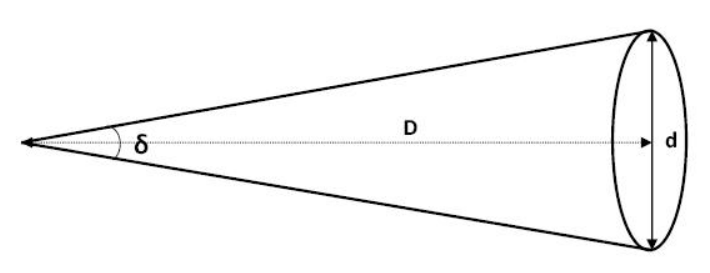
The angular diameter of a circle whose plane is perpendicular to the displacement vector between the point of view and the centre of said circle can be calculated using the formula[1]
- [math]\displaystyle{ \delta = 2\arctan \left(\frac{d}{2D}\right), }[/math]
in which [math]\displaystyle{ \delta }[/math] is the angular diameter, and [math]\displaystyle{ d }[/math] is the actual diameter of the object, and [math]\displaystyle{ D }[/math] is the distance to the object. When [math]\displaystyle{ D \gg d }[/math], we have [math]\displaystyle{ \delta \approx d / D }[/math], and the result obtained is in radians.
For a spherical object whose actual diameter equals [math]\displaystyle{ d_\mathrm{act}, }[/math] and where [math]\displaystyle{ D }[/math] is the distance to the centre of the sphere, the angular diameter can be found by the formula
- [math]\displaystyle{ \delta = 2\arcsin \left(\frac{d_\mathrm{act}}{2D}\right) }[/math]
The difference is due to the fact that the apparent edges of a sphere are its tangent points, which are closer to the observer than the centre of the sphere. For practical use, the distinction is only significant for spherical objects that are relatively close, since the small-angle approximation holds for [math]\displaystyle{ x \ll 1 }[/math]:[2]
- [math]\displaystyle{ \arcsin x \approx \arctan x \approx x }[/math] .
2. Estimating Angular Diameter Using the Hand
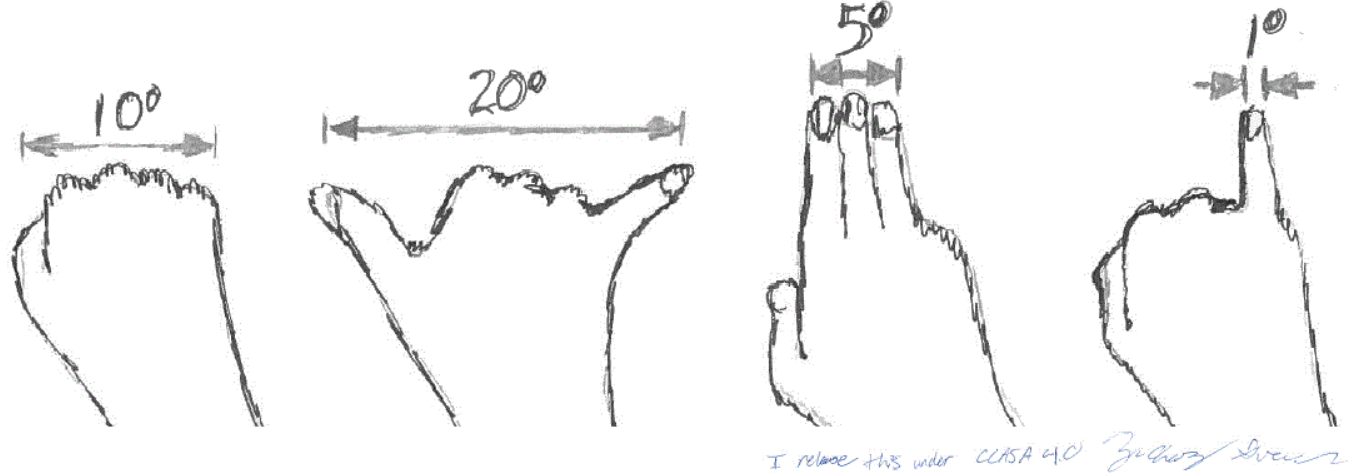
Estimates of angular diameter may be obtained by holding the hand at right angles to a fully extended arm, as shown in the figure.[3][4][5]
3. Use in Astronomy
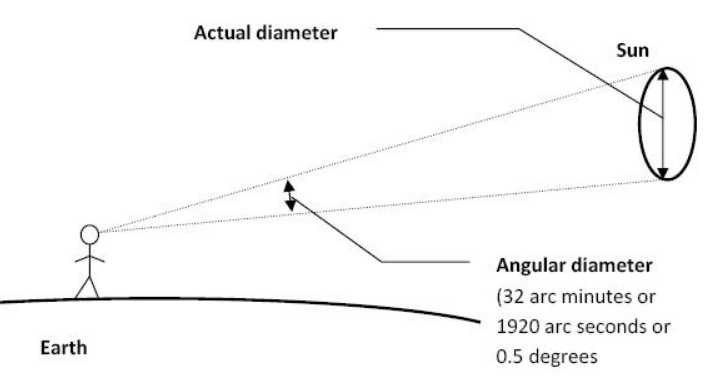
In astronomy, the sizes of celestial objects are often given in terms of their angular diameter as seen from Earth, rather than their actual sizes. Since these angular diameters are typically small, it is common to present them in arcseconds (″). An arcsecond is 1/3600th of one degree (1°), and a radian is 180/[math]\displaystyle{ \pi }[/math] degrees, so one radian equals 3,600*180/[math]\displaystyle{ \pi }[/math] arcseconds, which is about 206,265 arcseconds. Therefore, the angular diameter of an object with physical diameter d at a distance D, expressed in arcseconds, is given by:[6]
- [math]\displaystyle{ \delta }[/math] = (206,265) d / D arcseconds.
These objects have an angular diameter of 1″:
- an object of diameter 1 cm at a distance of 2.06 km
- an object of diameter 725.27 km at a distance of 1 astronomical unit (AU)
- an object of diameter 45 866 916 km at 1 light-year
- an object of diameter 1 AU (149 597 871 km) at a distance of 1 parsec (pc)
Thus, the angular diameter of Earth's orbit around the Sun as viewed from a distance of 1 pc is 2″, as 1 AU is the mean radius of Earth's orbit.
The angular diameter of the Sun, from a distance of one light-year, is 0.03″, and that of Earth 0.0003″. The angular diameter 0.03″ of the Sun given above is approximately the same as that of a person at a distance of the diameter of Earth.[7]
This table shows the angular sizes of noteworthy celestial bodies as seen from Earth:
| Celestial body | Angular diameter or size | Relative size |
|---|---|---|
| Andromeda Galaxy | 3°10′ by 1° | About six times the size of the Sun or the Moon. Only the much smaller core is visible without long-exposure photography. |
| Sun | 31′27″ – 32′32″ | 30–31 times the maximum value for Venus (orange bar below) / 1887–1952″ |
| Moon | 29′20″ – 34′6″ | 28–32.5 times the maximum value for Venus (orange bar below) / 1760–2046″ |
| Helix Nebula | about 16′ by 28′ | |
| Spire in Eagle Nebula | 4′40″ | length is 280″ |
| Venus | 9.7″ – 1′6″ | |
| Jupiter | 29.8″ – 50.1″ | |
| Saturn | 14.5″ – 20.1″ | |
| Mars | 3.5″ – 25.1″ | |
| Mercury | 4.5″ – 13.0″ | |
| Uranus | 3.3″ – 4.1″ | |
| Neptune | 2.2″ – 2.4″ | |
| Ceres | 0.33″ – 0.84″ | |
| Vesta | 0.20″ – 0.64″ | |
| Pluto | 0.06″ – 0.11″ | |
| R Doradus | 0.052″ – 0.062″ | |
| Betelgeuse | 0.049″ – 0.060″ | |
| Eris | 0.034″ – 0.089″ | |
| Alphard | 0.00909″ | |
| Alpha Centauri A | 0.007″ | |
| Canopus | 0.006″ | |
| Sirius | 0.005936″ | |
| Altair | 0.003″ | |
| Deneb | 0.002″ | |
| Proxima Centauri | 0.001″ | |
| Alnitak | 0.0005″ | |
| Event horizon of black hole M87* at center of the M87 galaxy, imaged by the Event Horizon Telescope in 2019. | 0.000025″
(2.5×10−5) |
|
| A star like Alnitak at a distance where the Hubble Space Telescope would just be able to see it[8] | 6×10−10 arcsec |
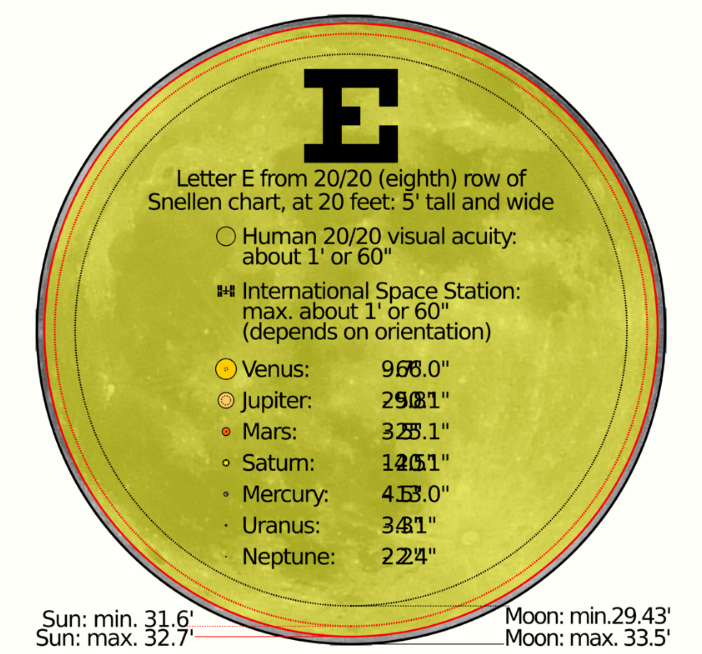
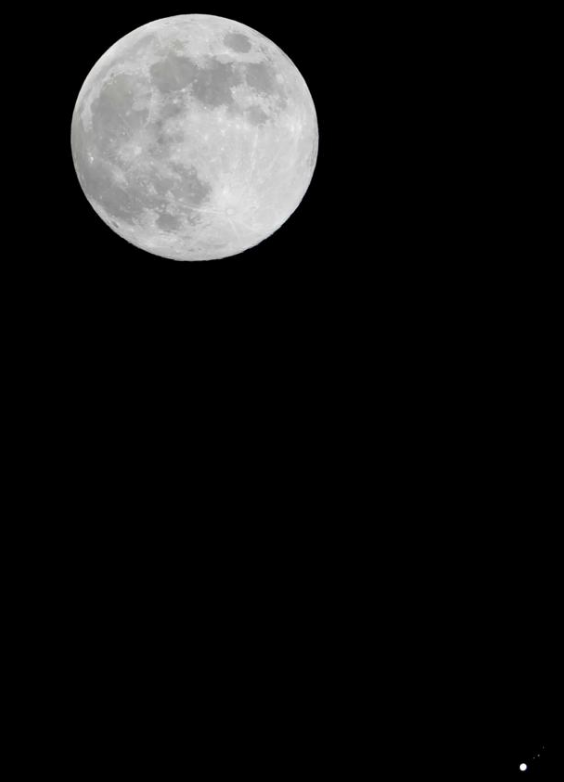
The table shows that the angular diameter of Sun, when seen from Earth is approximately 32′ (1920″ or 0.53°), as illustrated above.
Thus the angular diameter of the Sun is about 250,000 times that of Sirius. (Sirius has twice the diameter and its distance is 500,000 times as much; the Sun is 1010 times as bright, corresponding to an angular diameter ratio of 105, so Sirius is roughly 6 times as bright per unit solid angle.)
The angular diameter of the Sun is also about 250,000 times that of Alpha Centauri A (it has about the same diameter and the distance is 250,000 times as much; the Sun is 4×1010 times as bright, corresponding to an angular diameter ratio of 200,000, so Alpha Centauri A is a little brighter per unit solid angle).
The angular diameter of the Sun is about the same as that of the Moon. (The Sun's diameter is 400 times as large and its distance also; the Sun is 200,000 to 500,000 times as bright as the full Moon (figures vary), corresponding to an angular diameter ratio of 450 to 700, so a celestial body with a diameter of 2.5–4″ and the same brightness per unit solid angle would have the same brightness as the full Moon.)
Even though Pluto is physically larger than Ceres, when viewed from Earth (e.g., through the Hubble Space Telescope) Ceres has a much larger apparent size.
Angular sizes measured in degrees are useful for larger patches of sky. (For example, the three stars of the Belt cover about 4.5° of angular size.) However, much finer units are needed to measure the angular sizes of galaxies, nebulae, or other objects of the night sky.
Degrees, therefore, are subdivided as follows:
- 360 degrees (°) in a full circle
- 60 arc-minutes (′) in one degree
- 60 arc-seconds (″) in one arc-minute
To put this in perspective, the full Moon as viewed from Earth is about 1⁄2°, or 30′ (or 1800″). The Moon's motion across the sky can be measured in angular size: approximately 15° every hour, or 15″ per second. A one-mile-long line painted on the face of the Moon would appear from Earth to be about 1″ in length.
In astronomy, it is typically difficult to directly measure the distance to an object, yet the object may have a known physical size (perhaps it is similar to a closer object with known distance) and a measurable angular diameter. In that case, the angular diameter formula can be inverted to yield the angular diameter distance to distant objects as
- [math]\displaystyle{ d \equiv 2 D \tan \left( \frac{\delta}{2} \right) }[/math].
In non-Euclidean space, such as our expanding universe, the angular diameter distance is only one of several definitions of distance, so that there can be different "distances" to the same object. See Distance measures (cosmology).
3.1. Non-Circular Objects
Many deep-sky objects such as galaxies and nebulae appear non-circular and are thus typically given two measures of diameter: major axis and minor axis. For example, the Small Magellanic Cloud has a visual apparent diameter of 5° 20′ × 3° 5′.
3.2. Defect of Illumination
Defect of illumination is the maximum angular width of the unilluminated part of a celestial body seen by a given observer. For example, if an object is 40″ of arc across and is 75% illuminated, the defect of illumination is 10″.
References
- This can be derived using the formula for the length of a cord found at "Circular Segment". Archived from the original on 2014-12-21. https://web.archive.org/web/20141221042937/http://mathworld.wolfram.com/CircularSegment.html. Retrieved 2015-01-23.
- "A Taylor series for the functionarctan". Archived from the original on 2015-02-18. https://web.archive.org/web/20150218190328/http://www.mathstat.concordia.ca/faculty/rhall/mc/arctan.pdf. Retrieved 2015-01-23.
- "Coordinate Systems". https://dept.astro.lsa.umich.edu/ugactivities/Labs/coords/index.html.
- "Photographing Satellites". 8 June 2013. https://www.bartbusschots.ie/s/2013/06/08/photographing-satellites/.
- Wikiversity: Physics and Astronomy Labs/Angular size
- Michael A. Seeds; Dana E. Backman (2010). Stars and Galaxies (7 ed.). Brooks Cole. p. 39. ISBN 978-0-538-73317-5.
- http://www.google.com/search?hl=en&hs=3cj&q=arctan%286ft+%2F+12756.3+Km%29+in+arcseconds&btnG=Search
- 800 000 times smaller angular diameter than that of Alnitak as seen from Earth. Alnitak is a blue star so it gives off a lot of light for its size. If it were 800 000 times further away then it would be magnitude 31.5, at the limit of what Hubble can see.




